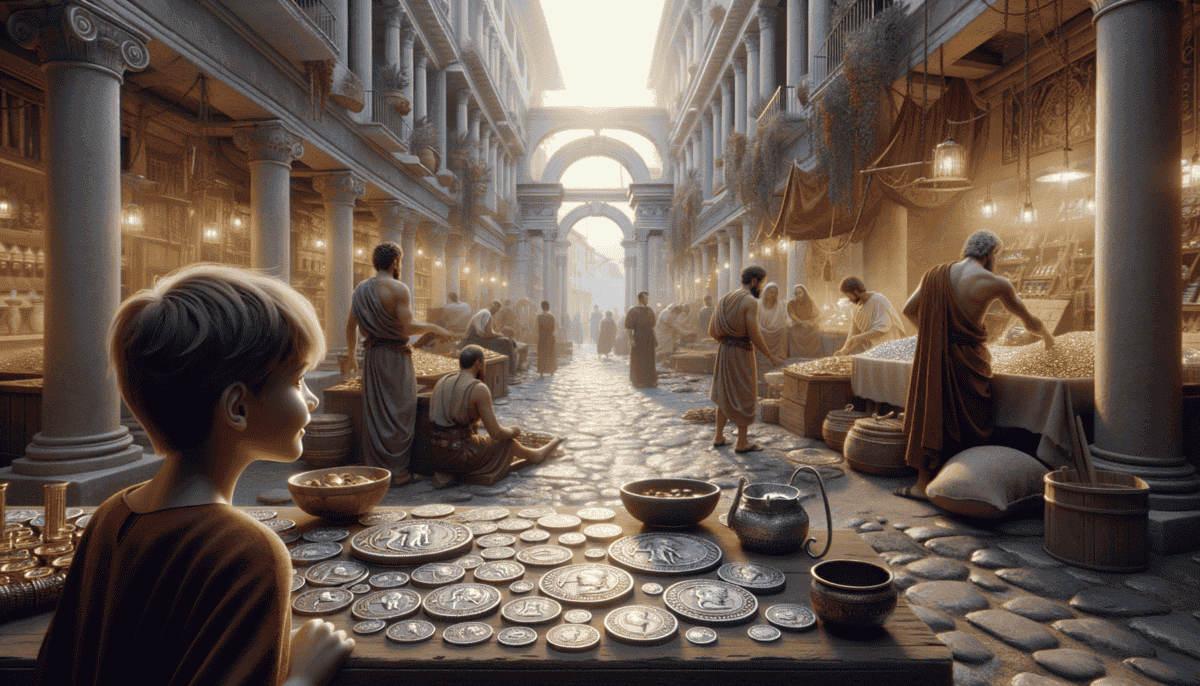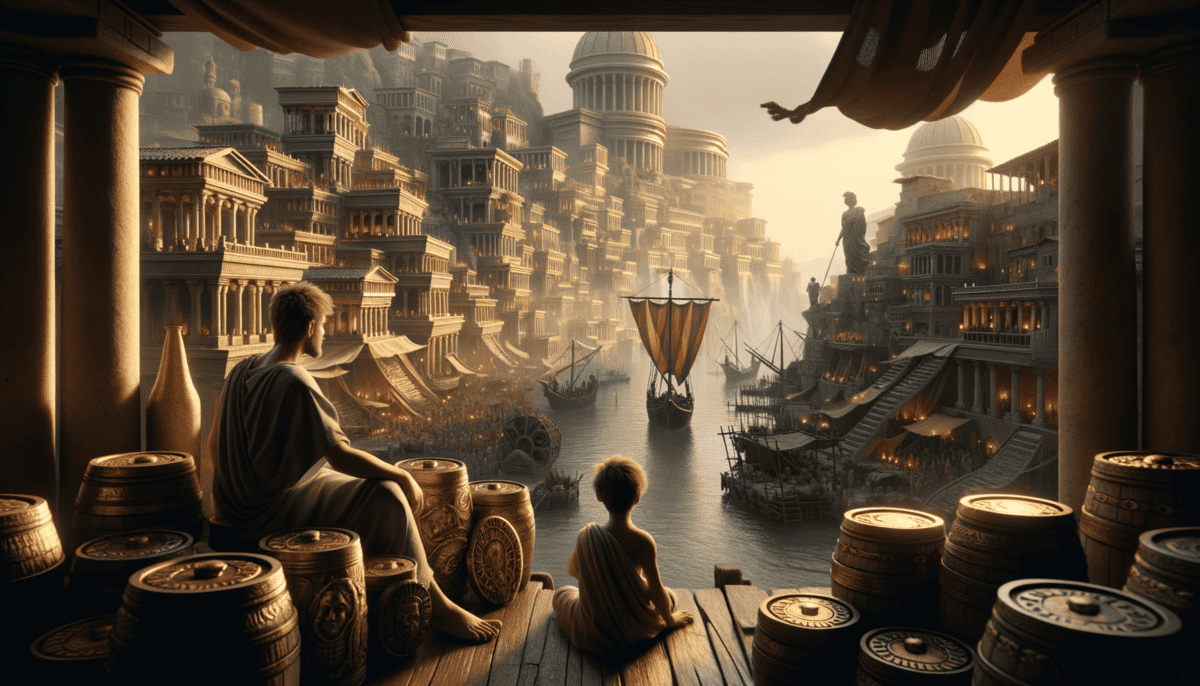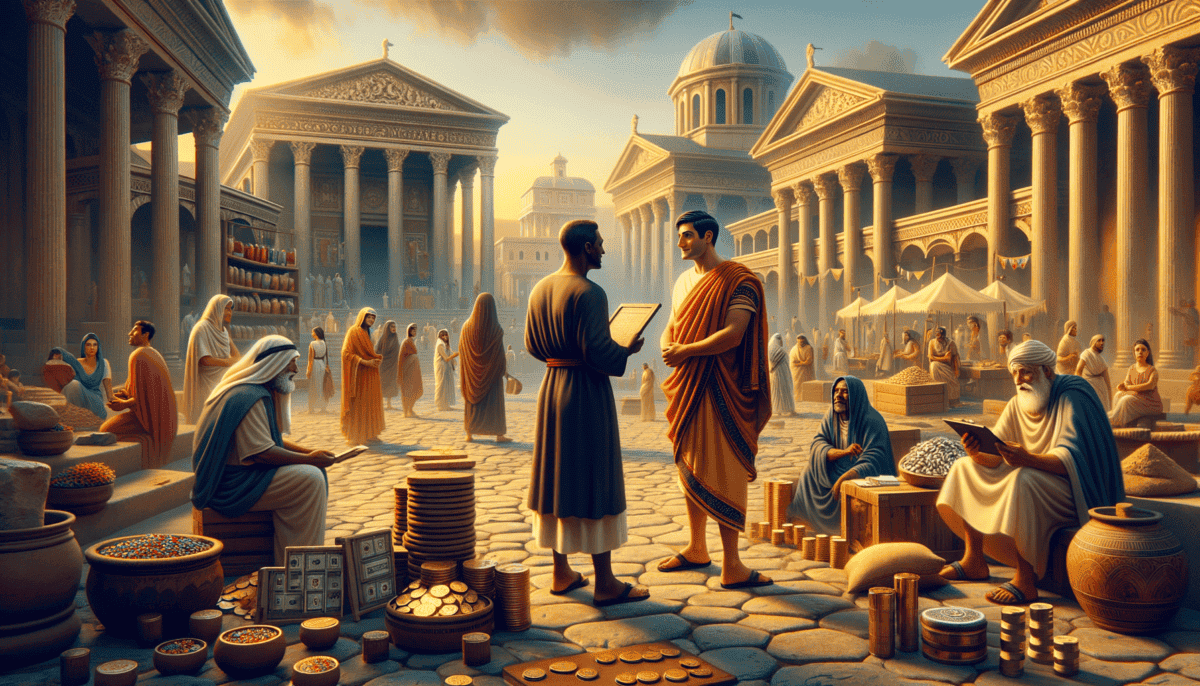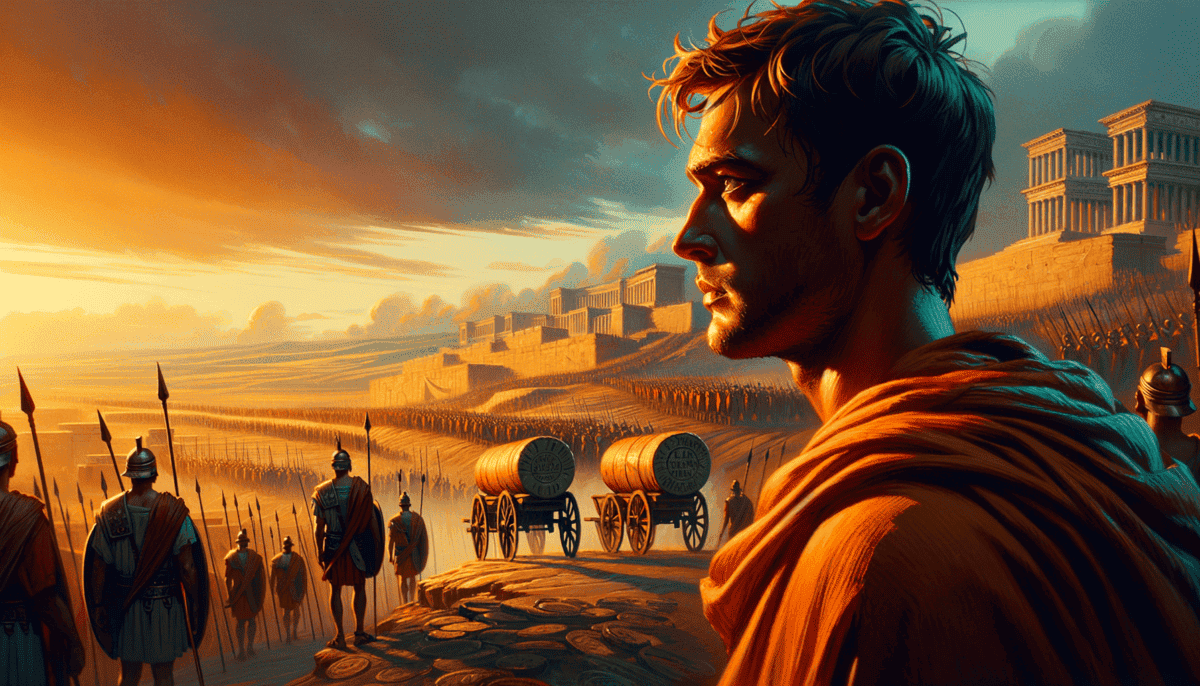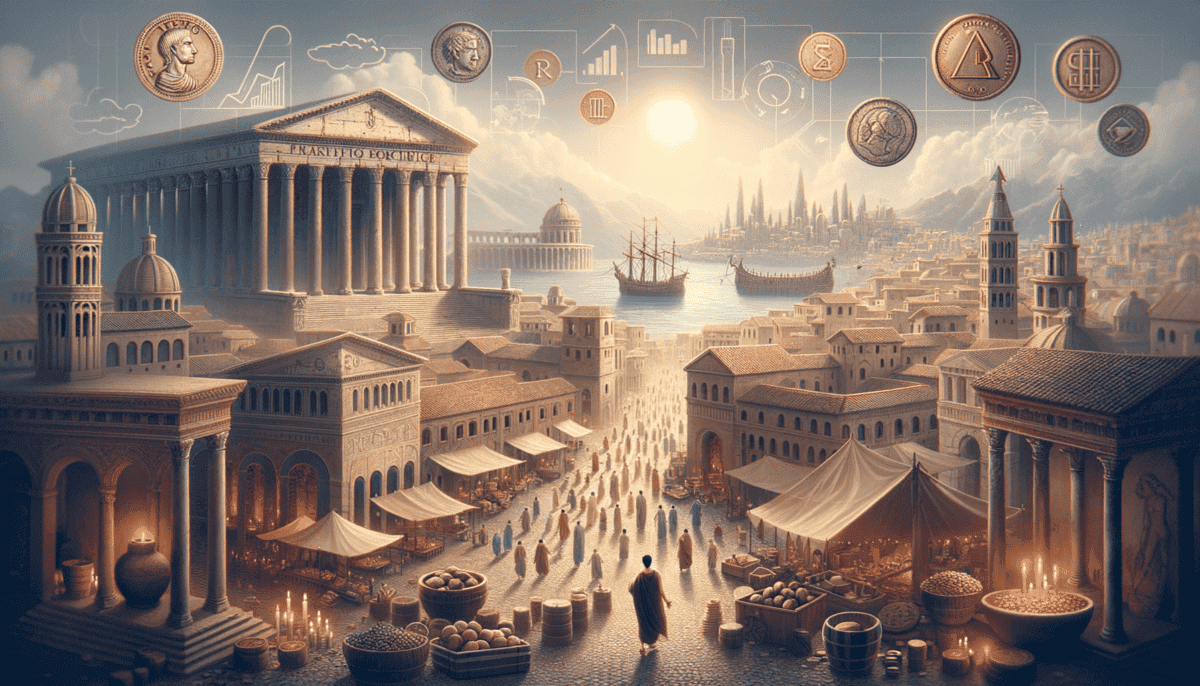The Bronze Bar Beginnings
Marcus jumped out of bed as the morning sun peeked through his window. The busy streets of Rome were already alive with the sounds of traders and shopkeepers. Today was special – his father promised to teach him about money!
"Father, I'm ready!" Marcus called out, running down the stone steps of their home.
Lucius, Marcus's father, smiled warmly. He held something heavy in his hands. "Look here, son. This is how Romans used to buy things before coins."
Marcus's eyes widened as he saw the long, rough piece of bronze. "It looks like a stick!" he giggled.
"Let's go to the market," Lucius said. "I'll show you how people trade."
The marketplace buzzed with activity. Sellers shouted about their fresh bread, colorful cloth, and ripe fruits. Marcus watched as a woman tried to trade a chicken for some olive oil.
"See how hard it is?" Lucius asked. "She has to find someone who wants her chicken AND has the olive oil she needs."
Marcus nodded thoughtfully. "That does seem tricky!"
The First Money Lesson
They stopped at a pottery stand. The owner held up a beautiful clay pot.
"Before we had proper money," Lucius explained, "people would break these bronze bars into smaller pieces to buy things. But look how rough and different each piece is!"
Marcus picked up a small bronze chunk. "How did people know how much it was worth?"
"They had to weigh it every time," his father said. "Some people tried to cheat by using lighter pieces!"
• Always weigh the bronze
• Check if the metal is pure
• Make sure both traders agree on the value
• Have witnesses for big trades
As they walked home, Marcus spotted a group of children playing with pebbles, pretending they were coins.
"Father," Marcus said excitedly, "I think I understand why we needed better money. It's like when we play games – everyone needs to follow the same rules!"
Lucius beamed with pride. "That's right! And tomorrow, I'll show you something even more exciting – the first Roman coins!"
That night, Marcus lay in bed, holding the small piece of bronze his father had given him. He imagined all the ancient Romans who might have held it before him, trading it for food, clothes, or toys. As he drifted off to sleep, he dreamed of markets filled with jingling coins instead of heavy bronze bars.
The Rise of Roman Coins
The next morning, Marcus could hardly wait to learn more. His father pulled out a small leather pouch that jingled when he shook it.
"Look what I have here," Lucius said, pouring shiny silver coins onto the table.
Marcus picked up one of the coins, his eyes sparkling. "It's so pretty! And look – there's a face on it!"
The Coin-Making Magic
"Want to see how they make these coins?" Lucius asked with a smile. Marcus nodded eagerly.
They walked to the coin-making workshop. The air was hot and filled with the sounds of metal hitting metal. Marcus watched in amazement as workers melted silver and poured it into round molds.
"First, they melt the metal," his father explained. "Then they make it flat and stamp pictures on both sides."
A worker showed Marcus two metal stamps. "These are called dies," he said. "Watch this!"
The Coin-Making Steps:
• Melt the metal
• Make flat round shapes
• Put the metal between two stamps
• Hit it hard with a hammer
• Check that the pictures look right
Shopping with New Money
Later, they went to the market again. This time, Marcus watched people using coins to buy things.
"See how much easier this is?" Lucius asked. "No more weighing heavy bronze bars!"
Marcus noticed how quickly people could count their coins. A baker handed a customer exactly three silver coins for a big loaf of bread.
"Father, everyone seems happier using coins," Marcus observed.
"Yes! And these coins work everywhere in Rome. Even in far-away places where Romans trade!"
A Special Gift
As the sun began to set, Lucius handed Marcus something special – his very first silver coin.
"This is a denarius," he explained. "Keep it safe. It's worth much more than those old bronze pieces."
Marcus held the coin carefully. "I can feel the pictures with my fingers!"
"Tomorrow," Lucius said, "I'll take you on a real trading trip. You'll see how these coins help us trade with people from all over the world!"
Marcus learned that good money should be:
• Easy to carry
• Hard to fake
• The same everywhere
• Beautiful to look at
• Trusted by everyone
That evening, Marcus carefully placed his new coin in a small box by his bed. He couldn't wait to learn more about trading with merchants from distant lands. As he fell asleep, he dreamed of sailing ships filled with treasure, all thanks to the amazing power of Roman coins.
Merchants and Markets
The salty breeze ruffled Marcus’s hair as he stood on the busy dock. Big ships with colorful sails filled the harbor.
“Today’s the day!” Marcus jumped with excitement. His father had promised to take him on a real trading trip.
“Ready for your first sea voyage?” Lucius asked, putting his hand on Marcus’s shoulder.
The Trading Ship
Their ship was called “The Mercury’s Wing.” It was loaded with olive oil, wine, and beautiful Roman pottery. The captain, a friendly man named Flavius, gave Marcus a tour.
“Look here,” Flavius pointed to a special chest. “This is where we keep our money safe. We have coins from all over!”
Meeting New Friends
As they sailed east, Marcus met traders from different lands. Each had interesting stories and different kinds of money.
“In Greece, we use these silver drachmas,” said Alexandros, showing Marcus a shiny coin.
“And in Egypt, we still use grain as money sometimes!” laughed Ptolemy, another trader.
Ways People Traded:
• Roman coins
• Foreign coins
• Trading goods
• Letters of credit
• Promises to pay
Learning About Banking
During the journey, Marcus watched his father do something interesting. He visited a banker in each port.
“Why do we need bankers, Father?” Marcus asked.
“Carrying too many coins is heavy and dangerous,” Lucius explained. “Bankers help us move money safely between cities.”
The banker wrote special notes that let them get money in other places. It was like magic!
Adventures in Trade
One day, a storm hit their ship. The waves were big, but Captain Flavius knew what to do.
“This is why we need insurance!” Lucius told Marcus. “We pay a little money to protect our cargo if something bad happens.”
When they reached Egypt, Marcus saw the great marketplace of Alexandria. It was bigger than anything in Rome!
“Remember, son,” Lucius said, “trade isn’t just about making money. It’s about building friendships and trust with people from all over the world.”
The Journey Home
Their ship returned to Rome loaded with new treasures: Egyptian cotton, spices from Arabia, and beautiful glass from Syria.
Marcus had learned so much. He now understood why his father said, “Money connects people across the whole world.”
Marcus discovered that good traders need:
• Trust
• Smart planning
• Knowledge of different cultures
• Understanding of money
• Bravery for long journeys
That night, Marcus added new coins from different lands to his collection. As he looked at each one, he remembered the friends he’d made and the amazing places he’d seen. Tomorrow, his father would teach him more about how Romans kept their money safe in banks.
The Money Masters
Marcus walked through the bustling streets of Rome, his sandals clicking on the stone pavement. The morning sun made the marble buildings shine like gold.
“Today is special,” his father said with a smile. “You’re going to learn how Romans keep their money safe.”
The Temple Treasury
They stopped at the Temple of Saturn. Its big columns reached up to the sky like giant tree trunks.
“Look, Marcus,” Lucius pointed to people carrying bags of coins. “They’re making deposits, just like putting money in a piggy bank!”
Meeting the Money Keepers
Inside, they met Cassius, a temple banker with kind eyes and quick hands.
“Welcome, young Marcus! Want to see something amazing?” Cassius led them to a special room.
“This is where we keep records of everyone’s money,” Cassius explained, showing Marcus wax tablets with neat writing. “Every coin that comes in or goes out is written down.”
The Banking Game
Cassius taught Marcus a fun game about banking:
How Roman Banking Worked:
• People bring coins for safekeeping
• Bankers write down the amount
• Money can be borrowed
• Interest is paid back
• Records keep everything fair
“It’s like taking care of other people’s treasure!” Marcus said excitedly.
Making Money Work
Next, they visited Quintus, a private banker who worked from his home. His counting table was called a “trapeza.”
“Watch this,” Quintus said, checking a coin. “We make sure every coin is real by looking, feeling, and even biting it!”
Marcus’s First Account
The most exciting part came when Lucius helped Marcus open his very own banking account.
“Here are ten denarii,” Lucius said, placing silver coins on the table. “This is your start in the banking world.”
Marcus watched proudly as Quintus wrote his name in the records. He was now a real Roman account holder!
Learning About Loans
As they walked home, they saw a farmer talking to a banker about a loan.
“Sometimes people need to borrow money,” Lucius explained. “Like when farmers need seeds before harvest time.”
Marcus learned that banks help people by:
• Keeping money safe
• Lending to those in need
• Keeping good records
• Helping businesses grow
• Making trade easier
The Evening Lesson
That night, Marcus counted his savings and practiced writing numbers like the bankers did.
“Father,” he asked, “can I be a banker someday?”
Lucius smiled. “With what you learned today, you’re already on your way. Tomorrow, we’ll see how this money helps our mighty Roman army.”
Marcus fell asleep dreaming of keeping treasure safe and helping people with their money, just like Cassius and Quintus had shown him. His toy soldier stood guard over his own small coin collection, ready for tomorrow’s new adventure.
The Price of Empire
Marcus woke up early, excited about visiting the military camp with his father. The morning air buzzed with the sound of marching legions. ♂️
The Legion’s Treasury
“Look there!” Lucius pointed to a heavily guarded building. “That’s where the army keeps its money.”
They watched as wagons full of coins arrived at the camp. Marcus’s eyes grew wide. “That’s more money than I’ve ever seen!”
Meeting the Military Banker
Inside, they met Flavius, the legion’s treasurer. His desk was covered with neat stacks of coins.
“Want to help me count the soldiers’ pay?” Flavius asked Marcus with a friendly smile.
“Each soldier gets 225 denarii every year,” Flavius explained. “That’s like buying 225 loaves of bread!”
The Army’s Money Box
What the Army Buys:
• Swords and shields
• Food for soldiers
• Horses and wagons
• Tents and clothes
• Building materials
“It takes a lot of coins to keep our army strong,” Lucius said. “Just like you need money for your toys.” ️
Paying the Troops
Marcus watched as soldiers lined up to get their pay. Each one checked their coins carefully.
“The soldiers save some of their money,” Flavius said. “We keep it safe for them, just like the banks in the city.”
The Cost of Victory
They walked to the training field where soldiers practiced with wooden swords.
“Each time Rome wins a battle,” Lucius explained, “we get new land, new riches, and new friends to trade with.”
Marcus’s Big Question
Marcus watched the soldiers training. “Father, how does Rome pay for such a big army?”
• Taxes from people
• Trade with other lands
• Gold and silver mines
• Gifts from friends
• Treasures from victories
The Evening March
As the sun set, they watched a legion march back from training. Their armor gleamed in the golden light. ⚔️
“Remember, Marcus,” Lucius said softly, “money helps make our army strong, but it’s the brave soldiers who keep Rome safe.”
Marcus stood straight and proud. He understood now why his father said money was like the blood of the empire – it kept everything moving and strong.
That night, Marcus arranged his toy soldiers differently. Instead of just fighting, some now carried tiny bags of pretend coins. He was learning that victory needed both brave warriors and smart money managers.
The Golden Legacy
Marcus sat in his father’s study, carefully counting coins from their latest trading voyage. The morning sun made the gold and silver pieces sparkle. ✨
A Time of Change
“Father, the coins feel lighter than before,” Marcus said, weighing a denarius in his palm.
Lucius nodded sadly. “Yes, son. Even mighty Rome faces money troubles sometimes.”
Learning from History
“Remember what I taught you about money?” Lucius asked, opening an old ledger.
“Save some coins for tomorrow. Trade fairly with others. Keep careful records of every coin.” Marcus recited proudly.
The Family Business
Marcus’s Money Rules:
• Count carefully
• Save regularly
• Spend wisely
• Help others
• Keep good records
“You’re ready now,” Lucius smiled. “Ready to help run our family’s banking business.”
A New Adventure
Marcus’s eyes lit up. After years of learning, he would finally become a real banker!
“Your first job is to help the baker get a loan for a new oven,” Lucius explained.
Making Plans
“We’ll need to check his old sales records,” Marcus said thoughtfully. “And make sure he can pay us back.”
Lucius beamed with pride. His son had learned well!
The Future of Rome
Looking out the window at the busy street, Marcus saw Rome’s great buildings shining in the sun.
From simple bronze bars to shiny gold coins
From market trades to complex banking
From paying soldiers to building an empire
A Promise to Remember
“Father,” Marcus said, standing tall. “I promise to be a good banker. I’ll help make Rome even stronger.”
Lucius hugged his son. “You already make Rome stronger, Marcus. You understand that money isn’t just coins – it’s about helping people build better lives.”
The Next Chapter
As evening fell, Marcus organized his new desk. His childhood toy soldiers still stood guard nearby, reminding him of all his adventures learning about Rome’s money.
Tomorrow would bring new challenges, but Marcus was ready. He had grown from a curious boy into a wise young banker, ready to help build Rome’s future, one coin at a time.
And so, the story of money in Rome continued, with each generation learning, growing, and making the empire stronger through smart banking and fair trade.
Marcus knew that as long as people remembered these lessons, their coins would keep spinning, their markets would keep buzzing, and their dreams would keep growing – just like they had in mighty Rome. ️


